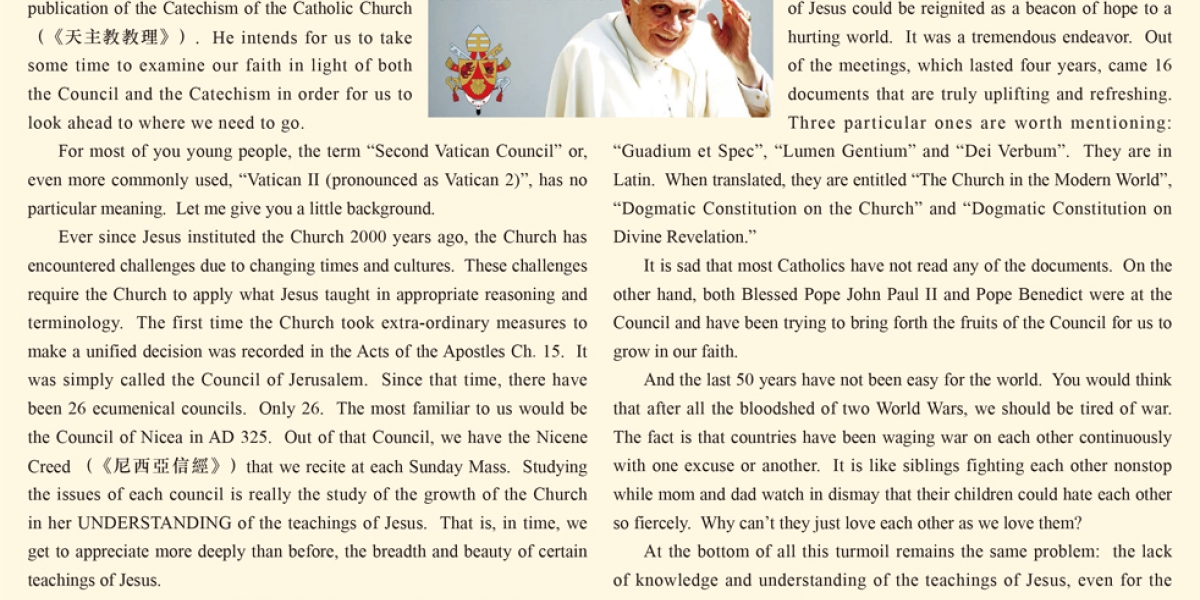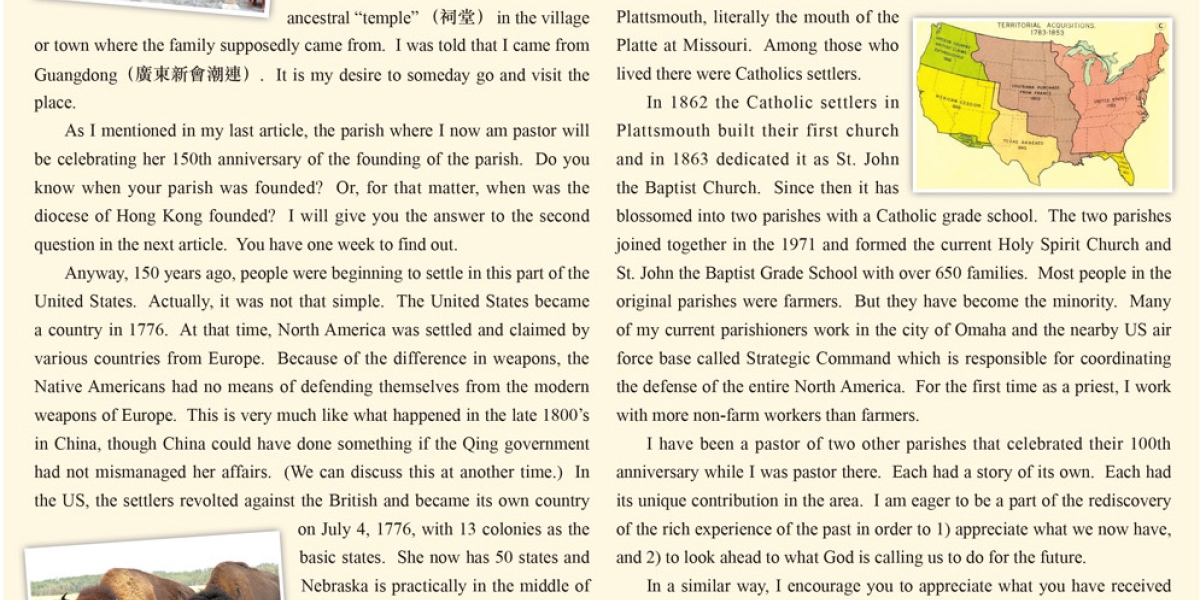昔日文章


Neither East Nor West
2012.09.28
Where are we going?
Pope Benedict announced the Year of Faith to celebrate the 50th anniversary of the Second Vatican Council (梵蒂岡第二屆大公會議) and the 20th publication of the Catechism of the Catholic Church(《天主教教理》). He intends for us to take some time to examine our faith in light of both the Council and the Catechism in order for us to look ahead to where we need to go.
For most of you young people, the term “Second Vatican Council” or, even more commonly used, “Vatican II (pronounced as Vatican 2)”, has no particular meaning. Let me give you a little background.
Ever since Jesus instituted the Church 2000 years ago, the Church has encountered challenges due to changing times and cultures. These challenges require the Church to apply what Jesus taught in appropriate reasoning and terminology. The first time the Church took extra-ordinary measures to make a unified decision was recorded in the Acts of the Apostles Ch. 15. It was simply called the Council of Jerusalem. Since that time, there have been 26 ecumenical councils. Only 26. The most familiar to us would be the Council of Nicea in AD 325. Out of that Council, we have the Nicene Creed (《尼西亞信經》)that we recite at each Sunday Mass. Studying the issues of each council is really the study of the growth of the Church in her UNDERSTANDING of the teachings of Jesus. That is, in time, we get to appreciate more deeply than before, the breadth and beauty of certain teachings of Jesus.
Back to Vatican II. After World War I in 1918 and, unimaginably, followed by World War II 20 years later, the world was hurting, really hurting. Almost all countries were suffering from devastation. People questioned whether there was any future for humanity if we could cause such pain to one another. Out of this sadness, Pope John XXIII called for the bishops of the world to gather in Rome to consider how the Church and the message of Jesus could be reignited as a beacon of hope to a hurting world. It was a tremendous endeavor. Out of the meetings, which lasted four years, came 16 documents that are truly uplifting and refreshing. Three particular ones are worth mentioning: “Guadium et Spec”, “Lumen Gentium” and “Dei Verbum”. They are in Latin. When translated, they are entitled “The Church in the Modern World”, “Dogmatic Constitution on the Church” and “Dogmatic Constitution on Divine Revelation.”
It is sad that most Catholics have not read any of the documents. On the other hand, both Blessed Pope John Paul II and Pope Benedict were at the Council and have been trying to bring forth the fruits of the Council for us to grow in our faith.
And the last 50 years have not been easy for the world. You would think that after all the bloodshed of two World Wars, we should be tired of war. The fact is that countries have been waging war on each other continuously with one excuse or another. It is like siblings fighting each other nonstop while mom and dad watch in dismay that their children could hate each other so fiercely. Why can’t they just love each other as we love them?
At the bottom of all this turmoil remains the same problem: the lack of knowledge and understanding of the teachings of Jesus, even for the majority of Catholics and other Christians. It is with this concern that Pope Benedict wants us to take some time to really study our faith. It is not enough that we say we believe. Our faith must have graspable reasons and livable practicality. In the next weeks, we will explore some of our history.


Neither East Nor West
2012.09.20
Family History
Have you ever traced the history of your family back a few generations? In our Chinese culture, there was a practice of placing the names of the children in the ancestral “temple” (祠堂) in the village or town where the family supposedly came from. I was told that I came from Guangdong(廣東新會潮連). It is my desire to someday go and visit the place.
As I mentioned in my last article, the parish where I now am pastor will be celebrating her 150th anniversary of the founding of the parish. Do you know when your parish was founded? Or, for that matter, when was the diocese of Hong Kong founded? I will give you the answer to the second question in the next article. You have one week to find out.
Anyway, 150 years ago, people were beginning to settle in this part of the United States. Actually, it was not that simple. The United States became a country in 1776. At that time, North America was settled and claimed by various countries from Europe. Because of the difference in weapons, the Native Americans had no means of defending themselves from the modern weapons of Europe. This is very much like what happened in the late 1800’s in China, though China could have done something if the Qing government had not mismanaged her affairs. (We can discuss this at another time.) In the US, the settlers revolted against the British and became its own country on July 4, 1776, with 13 colonies as the basic states. She now has 50 states and Nebraska is practically in the middle of the whole country.
In the area where I live, it was the Wild West where the buffaloes roamed. The territory was sold by the French to the United States in 1803 in what was called the Louisiana Purchase. The country began to settle and to develop the land west of the Missouri. It was this westward push that led to the European settlement at the confluence of the Platte and Missouri River and was named Plattsmouth, literally the mouth of the Platte at Missouri. Among those who lived there were Catholics settlers.
In 1862 the Catholic settlers in Plattsmouth built their first church and in 1863 dedicated it as St. John the Baptist Church. Since then it has blossomed into two parishes with a Catholic grade school. The two parishes joined together in the 1971 and formed the current Holy Spirit Church and St. John the Baptist Grade School with over 650 families. Most people in the original parishes were farmers. But they have become the minority. Many of my current parishioners work in the city of Omaha and the nearby US air force base called Strategic Command which is responsible for coordinating the defense of the entire North America. For the first time as a priest, I work with more non-farm workers than farmers.
I have been a pastor of two other parishes that celebrated their 100th anniversary while I was pastor there. Each had a story of its own. Each had its unique contribution in the area. I am eager to be a part of the rediscovery of the rich experience of the past in order to 1) appreciate what we now have, and 2) to look ahead to what God is calling us to do for the future.
In a similar way, I encourage you to appreciate what you have received and pray that God will direct you to do your part for the future generations that will come after you. “When much is given, much will be asked of you.” (Lk. 12:48).


Magic Mirror
2012.09.14
Gratitude
Last week, I witnessed a ridiculous scene on a bus. A little girl was non stop crying and no matter how her mother pampered her, the annoying cry continued. Then I overheard the conversation: "It's my fault to let you ride on a bus while the weather is so hot. The weak air conditioning makes you uncomfortable and mommy will never let you feel that way again", then there was silence. Is this called love or life?
I do not grow up with fancy toys or most advanced games, but definitely I am one of the happiest kids in the world. Being brought up in a highly disciplined way, I was once in the mist, too, not understanding why everything has to be done in a certain way.
Gradually I find it is a fortune to learn to be thankful instead of doubting every little details in life. Can you recall when is the last time saying thank you? One may think it is only a tiny act but who knows that may change the world! I am grateful to have fantastic parents, who have given me the best of everything. Never can I say enough "thank you" to their hard work, love and care. I am still learning to be a better person and hope one day they will find the foundation they laid for me has become a solid house - The house of gratitude!
Cherish what you have and live to the fullest to show your thankfulness.


English Around the World
2012.09.14
Packing a school bag
After a long summer holiday ( "vacation" in American English), are you very excited about going back to school? While you may feel very happy to see your classmates again, some of you might also find packing your own school bag a headache. How do you pack it properly? What are the most important things to pack?
The first thing to do is to closely follow the timetable ( "class schedule" in American English) and your personal school diary to check if you have put all the books and homework in that you need for the next day.
Then check your pencil case or pencil box carefully. Be organized and pack the right stationery. What stationery do you normally need? Pencils, pens, rubber ("eraser" in American English), a ruler, a sharpener, sellotape ("Scotch tape" in American English), etc. The most commonly-used pens are ballpoints or ballpoint pens. In British English, they are also called "biros", which is a brand of ballpoint pen. To delete mistakes in writing, you may use correction fluid. Generally, "Tipp-Ex is used in Britain and Ireland, while "Liquid Paper" and "Wite-Out" are used in Australia, Canada and the United States. These three names are trademarks.
You might also pack some snacks and drinks. Some schools may allow their pupils to bring along some playground items for fun during break time. Examples like badminton rackets, shuttlecocks, and skipping ropes ("jump ropes" in American English) are quite popular among primary school children. What kind of games do you normally play with your classmates?
After packing your school bag, do not forget to zip it up properly!
Sellotape:
透明膠帶
Correction fluid:
塗改液
Badminton rackets:
羽毛球拍
Shuttlecocks:
羽毛球
Skipping ropes:
跳繩用繩子


